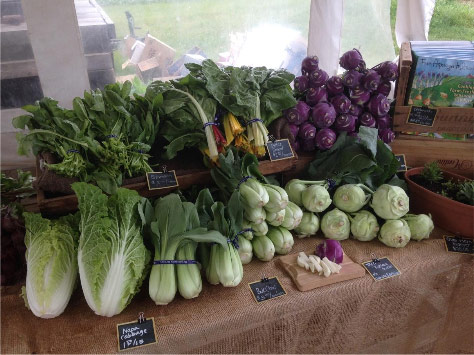
Beginner Farmer Needs Assessment: Constraints and Opportunities for Farming Beyond the 10 Year Mark in New England and California
Sara Riegler
Final Report: Henry A. Jastro Graduate Research Award
February 1, 2019
Throughout the summer and fall of 2018, I conducted fieldwork in New England and California looking at current realities of beginning and mid-career, small-scale, sustainable farmers in the US. My research was aimed at better understanding the challenges that these farmers face to their viability, how they perceive those challenges, and what they are doing to address them. I sought to understand the ways in which these farmers are or are not working towards structural change at the state and national level, if they are networked socially and politically with other farmers, and what these connections or lack thereof indicate about the status of the alternative food “movement”. In the face of ever-consolidating agribusiness, and the proliferation of a “step up or step out” model of neoliberal agricultural development worldwide, my goal was to illuminate the possibilities and threats to a localized, sustainable agriculture in a developed country.
In New England, I completed 15 in-depth interviews with farmers; 8 of these were in-person and on-farm and 7 were phone interviews conducted after an initial in-person meeting, either at a farmers’ market (I attended markets in Vermont, Maine, and Massachusetts to meet farmers) or at the Common Ground Fair in Unity, Maine. Interviewees were selected through personal networks, connections made at aforementioned markets and events, and through snowball sampling. In California, I conducted 10 in-depth interviews with farmers in Nevada, Placer, Yolo, Sonoma, and Napa counties; 9 of these were in-person and 1 was over the phone. Interviewees were selected through a variety of means, including collaboration with the National Young Farmer’s Coalition’s Western Organizer, contacts provided by advisors and colleagues here at UC Davis and at the Agricultural Sustainability Institute, and through snowball sampling.
During interviews, farmers revealed a deep passion for their work and the ethical and political rationale for their choosing farming as a livelihood. They also discussed the challenges of this choice and the economic, ethical, and political dilemmas therein, and nearly all of them expressed uncertainty as to their future as farmers. This will, in part, inform my analysis of the alternative food and farming movement and it’s viability into the future.
Jastro funding was used primarily for travel expenses to field sites in both New England and California, as well as attendance at the Maine Organic Farmers and Gardeners Association (MOFGA) annual conference and lab supplies such as an external hard drive. Additionally, a grant from Extension Risk Management Education’s (ERME) Western Center provided funding for California travel and transcription of California interviews.
The research will be compiled into a master’s thesis to be completed in Spring 2019 and presented at the Agriculture Food and Human Values Society (AFHVS) annual meeting in June 2019 in Anchorage, Alaska.
